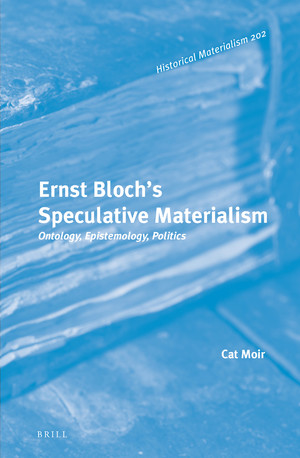Cat Moir
In Ernst Bloch’s Speculative Materialism: Ontology, Epistemology, Politics, Cat Moir offers a new interpretation of the philosophy of Ernst Bloch. The reception of Bloch’s work has seen him variously painted as a naïve realist, a romantic nature philosopher, a totalitarian thinker, and an irrationalist whose obscure literary style stands in for a lack of systematic rigour. Moir challenges these conceptions of Bloch by reconstructing the ontological, epistemological, and political dimensions of his speculative materialism. Through a close, historically contextualised reading of Bloch’s major work of ontology, Das Materialismusproblem, seine Geschichte und Substanz (The Materialism Problem, its History and Substance), Moir presents Bloch as one of the twentieth century’s most significant critical thinkers.
Biographical note
Cat Moir, Ph.D. (2014), University of Sheffield, is Senior Lecturer in Germanic Studies at the University of Sydney. She has published widely on the history of ideas in the German-speaking world.
Readership
Anyone interested in European intellectual history, the history of German philosophy, the history of radical ideas, Marxism, utopianism, and the philosophy of Ernst Bloch.
Table of contents
Preface
Introduction
1. The materialism problem
2. Ontology
Nature contra mechanism
Matter as the subject of nature
The logic of matter
Real possibility
Teleology without a telos
3. Epistemology
The structure of the concept
The influence of neo-Kantianism
The role of irony
Rationalism, empiricism, and practice
4. Politics
The German Philosopher of the October Revolution?
For Stalin, against Hitler
The Politics of Speculative Materialism
Speculation, totality, and immanent critique
Chapter 5: Relevance and critique
The speculative turn: Bloch and Meillassoux
New materialism: Bloch and Bennett
Ecological materialisms: Bloch, Foster, and Moore
Epilogue: The speculative expanse
Bibliography


